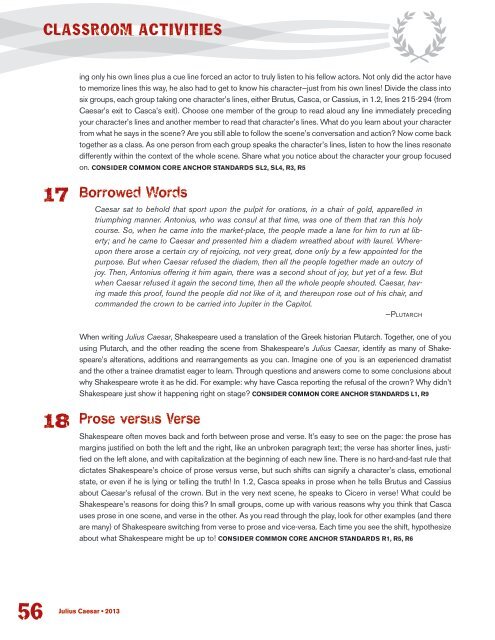Julius Caesar • 2013 - Chicago Shakespeare Theater
Julius Caesar • 2013 - Chicago Shakespeare Theater
Julius Caesar • 2013 - Chicago Shakespeare Theater
Create successful ePaper yourself
Turn your PDF publications into a flip-book with our unique Google optimized e-Paper software.
56<br />
CLASSROOM ACTIVITIES<br />
17<br />
18<br />
ing only his own lines plus a cue line forced an actor to truly listen to his fellow actors. Not only did the actor have<br />
to memorize lines this way, he also had to get to know his character—just from his own lines! Divide the class into<br />
six groups, each group taking one character’s lines, either Brutus, Casca, or Cassius, in 1.2, lines 215-294 (from<br />
<strong>Caesar</strong>’s exit to Casca’s exit). Choose one member of the group to read aloud any line immediately preceding<br />
your character’s lines and another member to read that character’s lines. What do you learn about your character<br />
from what he says in the scene? Are you still able to follow the scene’s conversation and action? Now come back<br />
together as a class. As one person from each group speaks the character’s lines, listen to how the lines resonate<br />
differently within the context of the whole scene. Share what you notice about the character your group focused<br />
on. CONSIDER COMMON CORE ANCHOR STANDARDS SL2, SL4, R3, R5<br />
Borrowed Words<br />
<strong>Julius</strong> <strong>Caesar</strong> <strong>•</strong> <strong>2013</strong><br />
<strong>Caesar</strong> sat to behold that sport upon the pulpit for orations, in a chair of gold, apparelled in<br />
triumphing manner. Antonius, who was consul at that time, was one of them that ran this holy<br />
course. So, when he came into the market-place, the people made a lane for him to run at liberty;<br />
and he came to <strong>Caesar</strong> and presented him a diadem wreathed about with laurel. Whereupon<br />
there arose a certain cry of rejoicing, not very great, done only by a few appointed for the<br />
purpose. But when <strong>Caesar</strong> refused the diadem, then all the people together made an outcry of<br />
joy. Then, Antonius offering it him again, there was a second shout of joy, but yet of a few. But<br />
when <strong>Caesar</strong> refused it again the second time, then all the whole people shouted. <strong>Caesar</strong>, having<br />
made this proof, found the people did not like of it, and thereupon rose out of his chair, and<br />
commanded the crown to be carried into Jupiter in the Capitol.<br />
—pluTarCh<br />
When writing <strong>Julius</strong> <strong>Caesar</strong>, <strong>Shakespeare</strong> used a translation of the Greek historian Plutarch. Together, one of you<br />
using Plutarch, and the other reading the scene from <strong>Shakespeare</strong>’s <strong>Julius</strong> <strong>Caesar</strong>, identify as many of <strong>Shakespeare</strong>’s<br />
alterations, additions and rearrangements as you can. Imagine one of you is an experienced dramatist<br />
and the other a trainee dramatist eager to learn. Through questions and answers come to some conclusions about<br />
why <strong>Shakespeare</strong> wrote it as he did. For example: why have Casca reporting the refusal of the crown? Why didn’t<br />
<strong>Shakespeare</strong> just show it happening right on stage? CONSIDER COMMON CORE ANCHOR STANDARDS L1, R9<br />
Prose versus Verse<br />
<strong>Shakespeare</strong> often moves back and forth between prose and verse. It’s easy to see on the page: the prose has<br />
margins justified on both the left and the right, like an unbroken paragraph text; the verse has shorter lines, justified<br />
on the left alone, and with capitalization at the beginning of each new line. There is no hard-and-fast rule that<br />
dictates <strong>Shakespeare</strong>’s choice of prose versus verse, but such shifts can signify a character’s class, emotional<br />
state, or even if he is lying or telling the truth! In 1.2, Casca speaks in prose when he tells Brutus and Cassius<br />
about <strong>Caesar</strong>’s refusal of the crown. But in the very next scene, he speaks to Cicero in verse! What could be<br />
<strong>Shakespeare</strong>’s reasons for doing this? In small groups, come up with various reasons why you think that Casca<br />
uses prose in one scene, and verse in the other. As you read through the play, look for other examples (and there<br />
are many) of <strong>Shakespeare</strong> switching from verse to prose and vice-versa. Each time you see the shift, hypothesize<br />
about what <strong>Shakespeare</strong> might be up to! CONSIDER COMMON CORE ANCHOR STANDARDS R1, R5, R6




